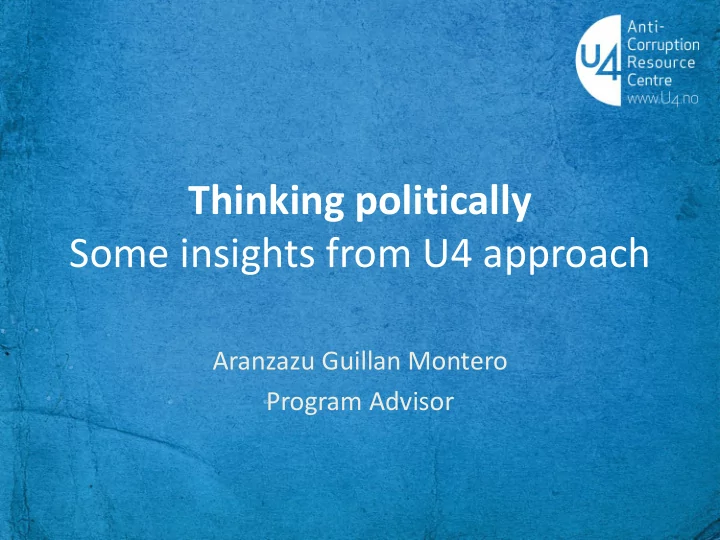

Thinking politically Some insights from U4 approach Aranzazu Guillan Montero Program Advisor
Thinking politically “Donor supported programs are well founded on analysis of political economy and corruption ... In recent years, the political economy discourse has evolved beyond that of simply noting the lack of political will to look more deeply into the main incentives, rules and constrains that characterize key institutions in Bangladesh... Donors have increasingly resorted to PEA to inform their programs, but this has yet to change the way they identify their partners or design their projects in the governance sector. » ( 2011 NORAD evaluation on A-C efforts in Bangladesh) How important is it to think politically? Are we thinking politically enough?
Why is thinking politically important? “After a decade of experience, we know that tackling corruption is politically complex but that progress can be made when appropriate reforms can be sustained ” (Campos & Pradhan, 2007) Problems to assess actual level of corruption A-C rests on diagnosis of risks, drivers & practices Identify & understand entry points Reality check on feasibility of reforms Promoting ownership & sustainability Understanding effectiveness Adoption of tools is contextually-bounded
Thinking politically at U4 Theories of Focused political Evaluation that change economy analysis captures political complexity • Methods for building • Case study research ToC for projects • Comparative • Review evaluation • Case studies of research methods & design practical examples • Systematic review of • Real life evaluations • Application of TOC in evidence base • New measurement tools training • Evaluation CoP
U4’s political analysis examples Applying Theories of Change • Issue paper: ToC in A-C • Training • Application to real examples Political Economy of REDD+ • Country case studies series • Issue paper: PE of Corruption in Kenya Proxy indicators • Policy brief: Bespoke indicators • Proxy indicators competition • Work with partners to implement them in projects
U4’s political analysis examples PE of corruption in fragile states • Policy brief: PE of corruption in fragile & conflict affected states Transparency & citizen engagement with SAIs • Issue paper: SAIs’ engagement with other stakeholders • Practice insight: SAIs’ engagement with citizens. The Latin American TPA Initiative Political analysis & donor interventions • Issue paper: Examining donor responses to corruption cases
Working with U4 partners Providing tools for political analysis • Online training • Course on corruption risk management in programs Bridging the gap between tools & practices • In-country workshops • Workshop on social accountability & people’s engagement at the local level Raising awareness & convening • Headquarters visits & working with partners • Collaboration around citizen engagement with SAIs
Challenges for thinking politically So what? On-time response Tools & approaches One-off tools and Practice Limited follow up exercises Gap governance & No cumulative sector/project specialists knowledge Scarce reflection on Limited capacities design & methods Organizational challenges Weak synergies Performance & Limited resources implementation indicators
Moving forward • Look at the evidence • Be strategic • Think out of the box Improving • Build on previous knowledge tools & • Promote organizational learning approaches • Awareness about design & methods • Build synergies: approaches, themes, projects • Actionability • Capacities & skills Translating analytical • Common language understanding • PE of donors into action • Prioritization • Performance & implementation indicators
Thinking politically as the ultimate safeguard: better risk management than being merely technical
Recommend
More recommend